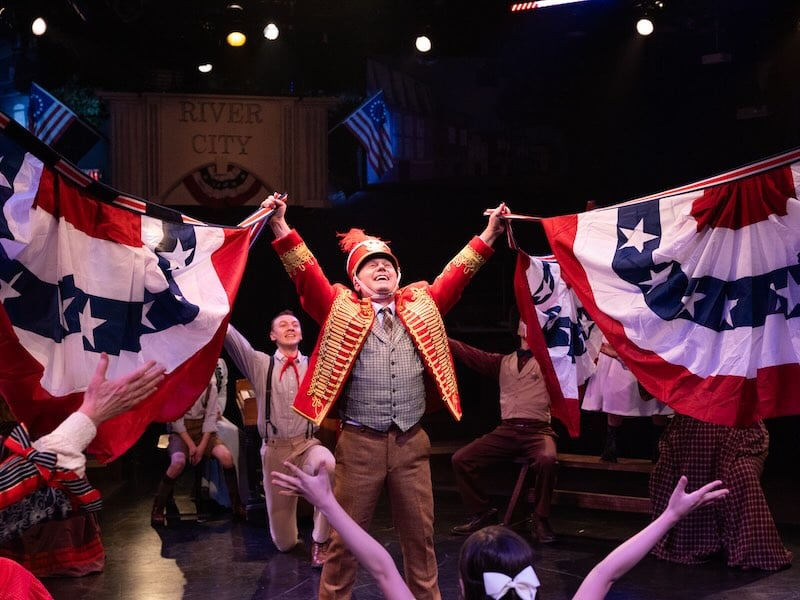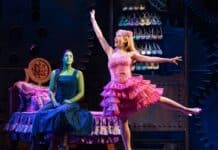Has anyone not seen The Music Man?
Ever since its 1957 Broadway debut ran for 1,375 performances, followed by major revivals in 1965, 1980, 1988, 2000, and 2022, two movie versions, and countless tour, community, and school productions, it is hard to imagine there are those who still haven’t encountered Meredith Willson’s story of a crafty traveling salesman who hoodwinks gullible parents into paying for expensive musical instruments and uniforms for a “kids’ band” and then skips town with the proceeds — until he meets his match in a small-town music teacher.

There are solid reasons why this is one of the most beloved and frequently performed musicals of Broadway’s Golden Age. It is sweet, nostalgic, and cheerful — but not too sweet, with its sassy tale of a complex con man who never gets his comeuppance and intends to seduce and abandon a “sadder but wiser girl” — i.e., a woman with a shady past. And the heroine is an older woman (well, as classic musicals go — she’s all of 26) who is smart, accomplished, knows her own mind, and is not simply waiting for her prince to come. It deals with age-old themes of bullying, self-confidence, the need to belong, insularity, mistrust and prejudice against outsiders, gossip, and gullibility. It also has some of the loveliest and catchiest tunes in the Great American Songbook — one of which, “Till There Was You,” was even covered by the Beatles!
But even the most melodious trumpet can get tarnished with age and overuse. How do you make fresh a show that has been done more times than “The Stars and Stripes Forever” has been played on the Fourth of July?
Toby’s Dinner Theatre pulls it off — by putting on a show that is more energetic, better sung, better danced, and simply shinier than any in recent memory.
The Music Man is usually thought to need elaborate sets, to evoke the small town of River City, Iowa, and community productions unfortunately often try but fall short in that regard. But Toby’s professional production manages with a bare minimum, making a virtue of necessity since, as always, the show is presented in the round. Shane Lowry’s sets consist simply of Main Street townscapes on the walls behind the audience, backlit with lovely sunset colors and blues in evening scenes, old-fashioned business signs, and the actors’ entrances marked by a quaint front porch, a bunting-bedecked Town Hall, and a Library with bookshelves that almost magically open out. All the rest of the locations are evoked by set pieces (including a piano, library desk, table and chairs, and the impressive Wells Fargo Wagon) moved in and out by the crack stage crew, while Director-Choreographer Mark Minnick deftly keeps the audience’s eyes occupied elsewhere.

Sarah King and Janine Sunday’s costumes are as elaborate as the sets are minimal. They conjure the era beautifully through the garish plaid suits of the salesmen, the sweet swirly dresses of the dancers, the lace-and-brocade-draped matrons (later replaced by amusing 1912 “workout clothes”) and their feather-festooned hats, which mimicked bobbing chickens in “Pick-a-Little, Talk-a-Little.” And, of course, there must be band uniforms, and these are gorgeous. Music Man is one of only a few shows (A Chorus Line, which Toby’s did last year, is the only other that comes to mind) that re-costumes the entire cast for the Curtain Call/Finale, and it is especially impressive for providing multiple costume changes for the rest of the show as well.
Of course, The Music Man without music would just be The Man — and Music Director Ross Scott Rawlings works even more than his usual magic, making the six-piece band sound like much more. For a Golden Age musical, there is more variation in song types than one might expect, including the rhythmic patter songs: “Rock Island,” performed impressively by the male chorus to mimic the sound of a chugging train, and the iconic and endlessly parodied “You Got Trouble.” It’s not too much of a stretch to say these driving, spoken numbers could be the first rap songs. But of all the fine musical numbers in the show, perhaps the most delightful of all are the Barbershop numbers (“Ice Cream/Sincere,” “Goodnight Ladies,” and “Lida Rose”). It is extremely difficult to find four male singers and turn them into a crack quartet — in the original production, the quartet was the original Barbershop champions, The Buffalo Bills — but here Rawlings does exactly that with Carter Crosby, Vince Gover, Alec Brashear, and David Bosley-Reynolds. Not only are they sublime singing just with each other; they are even more scrumptious in counterpoint to other numbers. I wished “Lida Rose/Will I Ever Tell You” could have gone on forever.
Mark Minnick’s choreography is equally excellent. In the Library, a dance first with only feet in an appropriate soft-“shhhhhh”shoe morphs into dancing on tables and then into a rousing Ragtime one-step and turkey trot. Later, “Shipoopi,” a relentless nonsense number that opens the second act and usually seems to go on forever, here simply shines with lively choreography delightfully performed, especially by the leading dance couple, Julia Williams and Dereck Atwater as Zaneeta Shinn and Tommy Djilas.
All the actors are well cast and generally fine. Alan Hoffman’s Mayor Shinn is suitably blustery, although as his wife, Lynn Sharp-Spears could have been a touch more commanding. Jane C. Boyle’s Mrs. Paroo was charming and forceful when needed, speaking some of her high notes rather than singing them, which worked very well. And on the night I saw the show, Julia Ballenger as Amaryllis and Elijah Doxtater as Winthrop were top-notch. Ballenger’s far-flying finger on her “cross-hand piano piece” is a hoot, and her lovely voice blending with Marion’s on Goodnight My Someone is charming. Doxstater has tremendous energy and presence in “Gary Indiana,” and when his delivery of every precisely choreographed move becomes a bit more natural, he will be a force to be reckoned with.
Of course, the show hinges on the performances of Marion Paroo and Harold Hill, and here they match the caliber of the rest of the production. Toby’s makes a practice of casting feisty leading ladies, and this is no exception. While Marion is never a shy violet, Janine Sunday here is even more impressive. Vocally, her lower register is so powerful one might question if she can make the high notes, and thus it is an even greater pleasure when she hits them effortlessly. She is certainly “no bright-eyed blushing, breathless baby-doll baby,” as Harold describes the sweet kind of ingenue he avoids like the plague. Her sensual demeanor when she reveals to Hill that she has known his secret since he first arrived, and then her using her “feminine wiles” to try to stop David James’s creepy Anvil Salesman from ratting Hill out (in the only scene in the show that feels somewhat uncomfortable in a modern context), she shows she is definitely in charge.
And as Harold Hill, Jeffrey Shankle shines. A longstanding leading man for Toby’s, he is definitely in his element here. He combines the charm, fast-talking slyness, and moral ambiguity that make him a convincing con man and maintains doubt as to whether he has actually reformed until the very end. He uses his voice well, whether he is talking, pattering, or singing, and is able to do justice to the melodies in his songs in a way the original Hill, Robert Preston, never could. The show rests on his shoulders, and he wears it as easily as a bandleader’s jacket.
Even if you’ve seen The Music Man a dozen times, see this one. And if, somehow, you’ve never had the pleasure, get tickets now. Toby’s Dinner Theatre has managed to polish up this well-worn vintage cornet and make it shine and sound sweeter than ever.
Running Time: Approximately two and a half hours with one intermission.
Meredith Willson’s The Music Man plays through May 18, 2025, at Toby’s Dinner Theatre, 5900 Symphony Woods Road, Columbia, MD. Tickets, including dinner and show (adult, $74–$92; child, $64–$67), can be purchased by calling 410-730-8311 or online.
The menu is here. The playbill is downloadable here.
Meredith Willson’s The Music Man
Book, Music, and Lyrics by Meredith Willson
Story by Meredith Willson & Franklin Lacey
Direction & Choreography by Mark Minnick
Music Direction by Ross Scott Rawlings



